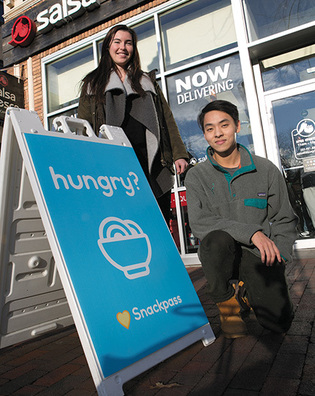 loading
loading
Light & VeritySharing smoothies, making breadA food-ordering app plans to conquer the world.  Julie BrownJamie Marshall ’19 and Kevin Tan ’17 are cofounders of Snackpass, which has rapidly taken off at Yale. View full imageThree indisputable things about students: they are hungry (especially when the dining halls are closed), they like bargains, and they are social animals. Knowing these things firsthand helped Kevin Tan ’17 and Jamie Marshall ’19 come up with Snackpass, a smartphone app that has spread across campus like wildfire since it was launched in June. By early December, just before the launch of a version for Android phones—it was previously available only on iPhones—more than 7,000 people were using the app. Tan and Marshall say an order goes through Snackpass every two minutes. Snackpass lets users order food from restaurants in New Haven (more than 60 in all), pay through the app, and skip the line when they pick it up. Anyone can use Snackpass, although some of the special discounts and rewards points that restaurants offer are reserved for students. That was the extent of the idea when Tan created the app this summer. But Tan’s eureka moment came when he wanted to catch the attention of a woman who he knew was a fan of the Tropical Smoothie Café on Dixwell. “I really wanted to be able to send her a smoothie through the app as a gift. That’s what turned it into Snackpass as we know it.” That idea of sharing—users connect with their friends on the app and can send them gifts or rewards points—has become a central part of Snackpass. “The social aspect is our competitive edge,” says Tan. Tan, Marshall, and cofounder Jonathan Cameron run the business from campus, with the help of a pack of interns and a few dozen student “ambassadors” who promote the app. Businesses pay Snackpass a monthly subscription fee and a commission on sales. Marshall says the feedback from restaurants has been good, and that the app is more effective than a lot of more-expensive marketing techniques. “Students like bringing business to mom-and-pops,” she says. “And the businesses can experiment with deep discounts on slow days.” Ask Tan just how far they intend to take Snackpass, and he answers with the calm, straight-faced bravado you see on TV shows like Shark Tank. “We think we can bring Snackpass to all college campuses . . . and beyond.” “He’s dead right,” says Andrew McLaughlin ’91, who directs the Tsai Center for Innovative Thinking at Yale, a newly launched hub for campus entrepreneurs and innovators. “They’ve nailed a business model. What makes it work in New Haven can work in cities all over the country.” And unlike a lot of startups, the Snackpass team has already figured out how to monetize their cool idea. “They’ve been earning cash from the get-go,” he says. “When you’ve been doing this for a while, you come to appreciate people who earn dollar one on day one.” At the end of the year, the team was expanding to Brown, a campus similar to Yale in a city similar to New Haven, and then to the mecca of college students—Boston. Tan doesn’t see a lot standing in their way. “There are lots of players in the delivery space, but not pickup,” he says. “We have a few competitors, but we think the social aspect and our brand as a whole will make people fall in love with us.”
The comment period has expired.
|
|